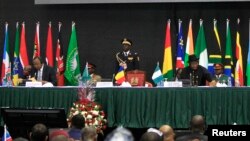The 26th Ordinary Session of the Executive Council of the African Union continued today with Foreign Ministers on the continent dissecting issues affecting the continent presently, in particular, terrorism in some countries like Nigeria where Boko Haram has become a menace, peace and security and related issues.
The ministers, meeting ahead of this week's heads of state and government summit, are also looking at the AU's annual report on the activities of the Commission in 2014 and other reports that may be tabled this week like the Obasanjo report looking into issues affecting the AU, including the need for more funding to be secured for the African Union.
The annual report highlights the work of the Commission on Agenda 2063 and steps undertaken to accelerate continental integration and ‘realize the aspirations of the peoples for a united, prosperous and peaceful Africa, driven by its people and acting as a dynamic force in global affairs’.
AU chairperson Dr. Nkosazana Dlamini-Zuma said Agenda 2063 is set for adoption by this Summit.
Following the Summit, a meeting will be called to do more work on the 10-year plan as well as the process of integration and domestication of Agenda 2063 in national and regional development plans.
“The work on the 10-year Plan means a concerted shift towards focusing on implementation of this continental vision. A number of critical issues arise from this, which we would like to bring to the attention of the Executive Council,” said Dlamini-Zuma.
“The centrality of human development and security in all of this cannot be over-estimated, as we are learning the hard lessons from the Ebola Virus Outbreak on the need to have resilient public health systems, and for integrated responses.”
She added the AU will continue to highlight domestic resource mobilization as a critical success factor for Agenda 2063. This, Dlamini-Zuma said, will ensure predictable funding of Africa’s institutions and programs, ranging from funding of elections, integration, project preparations for infrastructure and implementation of the African Mining Vision, among others.
For Agenda 2063 to be successful, she said, African leaders need to make sure they remain true to their commitment of silencing guns on the continent.
“If we fail to silence the guns and neutralize the threats of terrorism, intolerance and extremism; the risk of slow movement on integration, infrastructure and diversification of our economies due to both internal and external challenges; and the largest risk, failure to finance our development,” the AU chief said.
“It is not enough to identify the risks, we must go the next step to plan what to do to mitigate these risks.”
She added Africa’s population projections estimate that by the time the continent celebrates the first centenary of the founding of the OAU/AU, Africa will be the most youthful continent in the world raising the need for Africa to urgently scale up investments in its young people ‘to prepare them to assume a leadership role in all aspects of human endeavor, especially in entrepreneurship, science, innovation, technology, in politics’.
“We must do more and better for African youth,” she said, adding though this year has been set aside for African women’s empowerment, progress should be pushed for all communities.
Africa, she said, should not loose sight of progress made in the areas of democracy, good governance and human rights despite the challenges it continues to face.
“We must also do more this year to increase the representation of women in government, in the judiciary and other public and private institutions and their participation at the tables in peace negotiations,” Dlamini-Zuma said.
“I am quite sure that although this is a year of women, it is about our entire communities. After this year, we must really have an irreversible momentum towards the emancipation of women on the continent.”
“We take inspiration from the resolve we have collectively demonstrated in the responses of our people in the formulation of Agenda 2063, in the fight against Ebola, and in the ongoing and collective work to build a better life for all Africans.”
This year’s summit is discussing, among other issues, crises in South Sudan, the Central African Republic, terrorism. Ebola in West Africa and related issues.




